-
Tips for becoming a good boxer - November 6, 2020
-
7 expert tips for making your hens night a memorable one - November 6, 2020
-
5 reasons to host your Christmas party on a cruise boat - November 6, 2020
-
What to do when you’re charged with a crime - November 6, 2020
-
Should you get one or multiple dogs? Here’s all you need to know - November 3, 2020
-
A Guide: How to Build Your Very Own Magic Mirror - February 14, 2019
-
Our Top Inspirational Baseball Stars - November 24, 2018
-
Five Tech Tools That Will Help You Turn Your Blog into a Business - November 24, 2018
-
How to Indulge on Vacation without Expanding Your Waist - November 9, 2018
-
5 Strategies for Businesses to Appeal to Today’s Increasingly Mobile-Crazed Customers - November 9, 2018
Fed minutes: Conditions could “soon warrant” rate hike
If the Fed were to make a move in its upcoming September meeting, that would be its first hike to short-term interest rates this year.
Advertisement
A separate report from the Philadelphia Federal Reserve showed tenuous growth in regional manufacturing activity in the month of August. Concerns about the prospects for global economic growth, sagging inflation expectations and mixed readings on the United States economy have kept them sidelined.
New York Fed President William Dudley also had a hawkish tone Tuesday when he said “it is possible” in reference a rate hike in September, adding, “We are edging closer towards the point in time when it will be appropriate to raise rates further”.
Mr Dudley said he thought that solid job growth would continue and that the sluggish pace of the U.S. economy would pick up.
The U.S. dollar, though, weakened slightly (less than 0.1 percent) immediately after the minutes’ release, erasing a gain earlier in the day of about 0.3 percent.
Michael Gapen, the chief USA economist for Barclays, believes that a hike will likely come next month but said it all depends on whether the Federal Reserve officials focus on employment or inflation data more.
The probability of a USA rate increase by year-end is 47 percent, according to data compiled by Bloomberg based on fed fund futures.
Even the struggling British pound rose, jumping to a two-week high of US$1.3150 after United Kingdom retail sales for July beat forecasts, showing little sign that British shoppers had been affected by the Brexit vote.
The FOMC voted to leave its benchmark interest rate at 0.5% last month.
Fed officials have also expressed concern about the tepid pace of US growth, weakness in worker productivity, excessively low inflation and the long-term consequences of the United Kingdom’s vote in June to leave the EU.
Investors are awaiting an annual meeting of central bankers from around the world in Jackson Hole, Wyoming, next week, in which Fed chair Janet yellen is likely to cement expectations for a slow pace of rate increases.
It also showed that “several preferred to defer another increase in the federal funds rate until they were more confident that inflation was moving closer to 2 percent on a sustained basis”.
The one clear area of agreement was that more data is needed before the Fed starts raising its short-term lending rate.
However, some officials were still concerned that longer-term global risks related to Brexit vote remained. The FOMC remained divided on the near-term danger of inflation, as it was in its June meeting, with some seeing little threat but others anxious that there could be a sudden upward push on prices as the labor market continues to tighten.
Although near-term concerns associated with the United Kingdom’s vote to leave the European Union had dwindled, officials mentioned other threats that needed to be closely monitored, including the possibility that growth in the United Kingdom and the European Union could be slower than expected.
Advertisement
– “With the United States dollar under pressure and the FOMC minutes released we may finally see gold break out of the $1,330 – $1,360 range for an attempt toward the early July high of $1,375. They’re afraid of tipping it into recession”, said Levine. They seem to think the upshot is that any rate increase is some way off. “It’s another wait-for-more-data, that’s the message”.





























